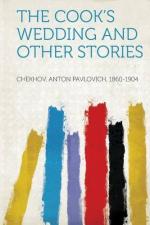“Auntie, why do they look like that?” Pashka asked the nurse.
“They have got smallpox, little lad.”
Going back to his own ward, Pashka sat down on his bed and began waiting for the doctor to come and take him to catch finches, or to go to the fair. But the doctor did not come. He got a passing glimpse of a hospital assistant at the door of the next ward. He bent over the patient on whose head lay a bag of ice, and cried: “Mihailo!”
But the sleeping man did not stir. The assistant made a gesture and went away. Pashka scrutinised the old man, his next neighbour. The old man coughed without ceasing and spat into a mug. His cough had a long-drawn-out, creaking sound.
Pashka liked one peculiarity about him; when he drew the air in as he coughed, something in his chest whistled and sang on different notes.
“Grandfather, what is it whistles in you?” Pashka asked.
The old man made no answer. Pashka waited a little and asked:
“Grandfather, where is the fox?”
“What fox?”
“The live one.”
“Where should it be? In the forest!”
A long time passed, but the doctor still did not appear. The nurse brought in tea, and scolded Pashka for not having saved any bread for his tea; the assistant came once more and set to work to wake Mihailo. It turned blue outside the windows, the wards were lighted up, but the doctor did not appear. It was too late now to go to the fair and catch finches; Pashka stretched himself on his bed and began thinking. He remembered the candy promised him by the doctor, the face and voice of his mother, the darkness in his hut at home, the stove, peevish granny Yegorovna . . . and he suddenly felt sad and dreary. He remembered that his mother was coming for him next day, smiled, and shut his eyes.
He was awakened by a rustling. In the next ward someone was stepping about and speaking in a whisper. Three figures were moving about Mihailo’s bed in the dim light of the night-light and the ikon lamp.
“Shall we take him, bed and all, or without?” asked one of them.
“Without. You won’t get through the door with the bed.”
“He’s died at the wrong time, the Kingdom of Heaven be his!”
One took Mihailo by his shoulders, another by his legs and lifted him up: Mihailo’s arms and the skirt of his dressing-gown hung limply to the ground. A third—it was the peasant who looked like a woman—crossed himself, and all three tramping clumsily with their feet and stepping on Mihailo’s skirts, went out of the ward.
There came the whistle and humming on different notes from the chest of the old man who was asleep. Pashka listened, peeped at the dark windows, and jumped out of bed in terror.
“Ma-a-mka!” he moaned in a deep bass.
And without waiting for an answer, he rushed into the next ward. There the darkness was dimly lighted up by a night-light and the ikon lamp; the patients, upset by the death of Mihailo, were sitting on their bedsteads: their dishevelled figures, mixed up with the shadows, looked broader, taller, and seemed to be growing bigger and bigger; on the furthest bedstead in the corner, where it was darkest, there sat the peasant moving his head and his hand.




